“Still I hope I shall always possess firmness and virtue enough to maintain (what I consider the most enviable of all titles) the character of an honest man.”
George Washington to Alexander Hamilton on August 28, 1788
The world collectively held its breath as the election for the 46th President of the United States of America was held during November, and has subsequently been rumbling on over the entire month. For interminable days it seemed to hang on a knife edge, and now, thankfully, Joe Biden has unequivocably emerged as the victor. But the election has been embroiled in quite a circus…
During such times of upheaval and turmoil around the world it’s essential that we have a grown-up in the White House rather than a self-inflated, messianic enfant terrible.
Trump has thrown multiple tantrums about how unfair democracy is, and has behaved like a desperate despot wanting to cling to power at any cost. It’s damaging not just for America, (being the beacon of freedom and democracy that it is in the world), but also for global democracy, when the perceived leader of the free world acts like some third-world, tin-pot dictator by refusing (until recently), to collaborate with the incoming administration for the good of the nation.
What kind of example is that?
Trump’s antics over the last four years have brought the Office of President into disrepute. His legacy is a litany of lies and ‘fake news’ accusations, the desecration of values, the demolition of decency, the destruction of integrity, willful ignorance around environmental issues, mishandling of the pandemic and the spread of division, hate, racial tensions and the complete polarisation of a nation.
The man (and I hope someday woman), serves the office, not the reverse!
There is still a way to go before the vote is certified and thankfully the unnecessary and baseless legal challenges from the incumbent president have been thrown out. His apparent denial of the facts and manner of departure will further test America’s democracy.
“The Constitution was designed not to give us rights but to prevent government from taking our rights.”
Thom Hartmann, Unequal Protection: The Rise of Corporate Dominance and the Theft of Human Rights
Biden strikes me as a man of competence, common-sense, caring and humility – a breath of fresh air to Trump’s insouciant attitude toward responsibility, and his unrepentant vanity and hubris.
America, and (like ripples travelling across a pond) to a lesser extent the world, is reeling from the onslaught of an egomaniac and chancer tyrant. The fact that more people have voted in the 2020 election, (close to 150 million people) than at any other time in its 244 year history as the United States of America speaks volumes.
Balance must be restored – now the scales can start tipping towards the safer mid-point. How much damage has been done remains to be seen, and Biden is right to suggest that the nation needs to heal.
The fact that sanity has prevailed is in no small measure due to the principles and values that the Founding Fathers employed in the Declaration of Independence and the Constitution. These documents are sacred and integral to the founding of the United States of America. They are the bedrock and cornerstone of America’s power and prosperity.
But the severance of the colonies from George III’s distant rule was far from smooth. After the dust had settled from the Revolutionary War, a handful of men courageously saw a vision of what their nation could become.
The founding of the United States has been an incredible experiment in the evolution of human civilisation.
Tweet
With its isolated geopolitical borders the United States of America was free from outside interference once they had eliminated servitude to the British monarchy. Inspired by the sheer unlimited potential and opportunities for a better life, a wave of immigration seeded the nation with a diverse population – an ideal cultural petri dish for the growth of the New World.
By looking to the microcosm of America we can apply the knowledge, wisdom and learning of human civilisation and evolution to the macrocosm – the world at large.
The only pre-existing cultural personality in the newly formed United States of America was that of the native Indian populations, it was still early days for the first generations of settlers, but their spirit of adventure, innovation and discovery has certainly permeated down through the centuries.
Unlike the more established nations across Europe, (where citizens were limited by their highly stratified caste-like society and hierarchy of power, usually predicated by blood lineage), America was a blank canvas for her citizens, where, on paper at least, all men were created equal; endowed by their creator with certain unalienable rights, and among these are Life, Liberty and the Pursuit of Happiness.
In the United States Declaration of Independence, for instance, it was stated with great clarity by the originators that the rights of man stem from the divinity of their creation, and thus was established the principle of spirituality. However they differentiated this from religion by saying that citizens are to be free from the establishment of any religion. The founders were aware that religion divides and is based on secular power, whereas, spirituality unites and has no worldly organization.”
Dr. David R Hawkins
Sadly, these lofty ideals have not always proved the lived experience for many with darker skins, those of the ‘fairer sex’ or other minority groups. There is plenty of unfinished business, hence still, even in the 21st century, the #BlackLivesMatter movement was deemed necessary to attain a fairer, more egalitarian society. But the values are at least enshrined in its founding, the Constitution and Bill of Rights, and therefore inextricable from the nation’s cultural and social evolution.
The values and courage of the Founding Fathers
The Deistic Enlightenment philosophy that was sweeping through 1700s Europe, as espoused by its leading philosophers such as John Locke, Voltaire and Jean-Jacques Rousseau (whose raptures of ‘free’ noble savages intrigued many), resonated with Thomas Jefferson, George Washington and Benjamin Franklin.
“These men (who signed the Declaration) were the most idealistic and determined among the colonists. While the conservatives of the day argued that America should remain a colony of England forever, these liberal radicals believed in both individual liberty and societal obligations.”
Thom Hartmann
Washington, Jefferson, Franklin, Adams, Hancock and the other 56 delegates who signed the Declaration of Independence did so knowing that they would pilloried, ostracised, suffer financial hardship, ruin and possibly death. This act was no tea party!
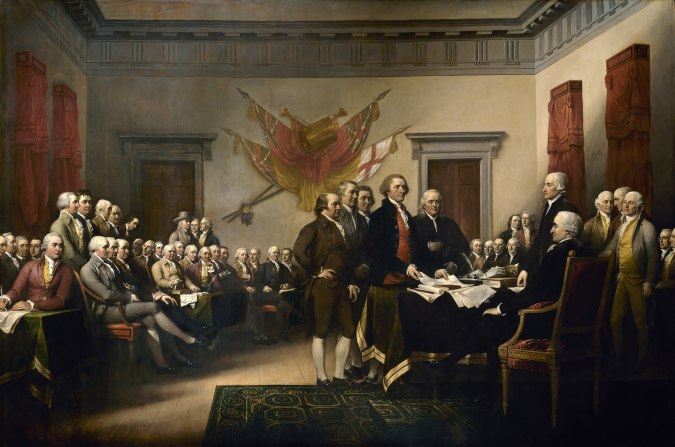
When they wrote: ‘We mutually pledge to each other our lives, our Fortunes, our Sacred Honor’ they were legally marking themselves as traitors, knowing the penalty for treason was death. Patrick Henry’s passionate statement, “Give me liberty or give me death!” was not merely hyperbole. When Benjamin Franklin said to his fellow revolutionaries, “We must all hang together or we shall most assuredly hang separately,” he was speaking literally.
John Hancock was the wealthiest of the American revolutionaries, with a net worth of around $750,000 in today’s dollars. Another wealthy signatory, Thomas Nelson of Virginia, had his lands and home seized by the British and died penniless at the age of 50. Hartmann purports that 9 of the 56 signers lost their lives in the war and 17 lost their homes and fortunes.
Hartmann further explains: “While many of the conservative Tory families still have considerable wealth and power (in Canada and England), not a single founder’s family persists today as a wealthy or politically dominant entity.”
It was inevitable that cynical attacks would be made on their characters in the years since the founding of the nation. They were not perfect human beings; their personalities contained flaws and contradictions like the rest of us – however, their hearts were in the right place. It’s worth remembering that this enlightened band of brothers stood up to what was then the greatest power in the world – the British Empire.
Their Deist beliefs meant that the Declaration of Independence encapsulated Natural Law: the notion that ordinary humans could be equal sovereign citizens who endow government with authority, instead of the other way around.
The tenets of Natural Law
In 1661 English philosopher Thomas Hobbes published his work, Leviathan, which attempted to codify Natural Law into 9 principles:
- Seek peace first, use war as a last resort.
- Be willing to offer the same freedom to others as to oneself.
- Keep your agreements.
- Practice gratitude.
- Accommodate your own needs to the laws of the community.
- As appropriate, forgive those who repent.
- In the case of revenge, focus not on the great evil of the past but the greater good to follow.
- Never declare hatred of another.
- Acknowledge the equality of others.
John Locke sought to hold governments accountable to these principles. In his Two Treatises of Government which was initially published anonymously in 1689 he suggested that if a ruler went against these natural laws and failed to protect ‘life, liberty and property’ the populace could justifiably overthrow a government. It happened in France in 1789, and heads rolled as a consequence…
One could argue that Brexit has removed some of our rights and liberties.
Jefferson used Locke’s arguments when he crafted the Declaration of Independence. But the Enlightenment philosophers were not the only influence on the Founding Fathers. Locke and Rousseau got their ideas from the Native’s New World.
Quite a circle of serendipity…
The ideals of human perfection existed in Europe since the golden age of Greece, but the idea of life, liberty and the pursuit of happiness never actualised from an abstract concept to reality in Socrates’ world of form.
The first reports of the ways and customs of the native peoples of the Americas showed the concepts of democracy and balance of power were well established in these cultures at least 400 years before the signing of the Declaration of Independence. Some say as early as 1100, but there are accounts from the 1400s to 1500s of six tribes that lived in what is now the northeastern United States, Southern Ontario and Quebec, a people who came together to form what was known as the Iroquois Confederacy.
The Iroquois Confederacy
Hiawatha was instructed by an elder named Two-Rivers to negotiate peace between the warring tribes. He proposed a League of Peace and Power to bring the tribes together. The result of this historic gathering bore the League of Haudenosaunee, meaning ‘people of the long house’.
“Every human longs for peace and love.”
Hiawatha
The confederacy was comprised of the Mohawk, Oneida, Onondaga, Cayuga and Seneca tribes, later accepting the Tuscaroras who migrated from the Carolinas. Through this confederacy, six diverse nations managed to live in relative peace and harmony through a remarkable political system that was the forerunner to the United States Constitution.
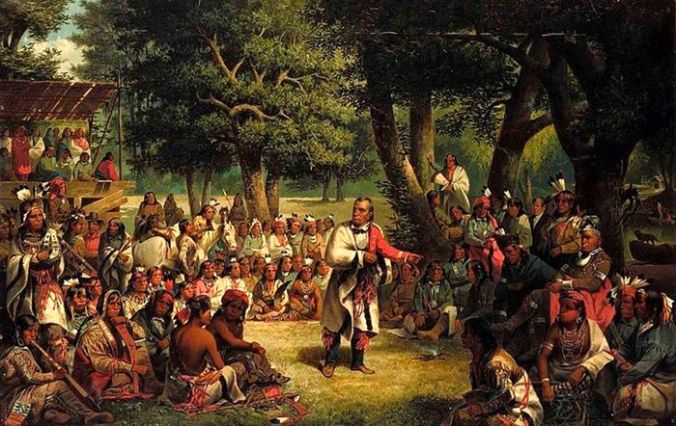
There are many similarities between the Iroquois Confederacy and the Constitution: namely the devolvement of power in the federal system – just as tribes maintained autonomy in regard to local issues.
A mutual-defense pack provided a strong multi-tribe nation to protect against their enemies. It conserved lives, energy and resources that would otherwise have been spent in waging war with each other. The confederacy also employed a sophisticated system of checks and balances between three governmental branches.
The Iroquois Nation of colonial America believed in freedom of expression, provided that expression caused no harm.
Tweet
Whereas Western civilisation was more guilt orientated, tribal culture was more shame-orientated – a strong identification within the community motivated individuals to avoid transgressions that might bring shame on them and their clan.
“Human happiness and moral duty are inseparably connected.”
George Washington
The influence of Native American culture was profound and far-reaching on the early colonists, particularly those who grew up in the New World rather than England. The colonists adopted indigenous customs such as bathing, not considered a healthy practice across much of Europe at the time.
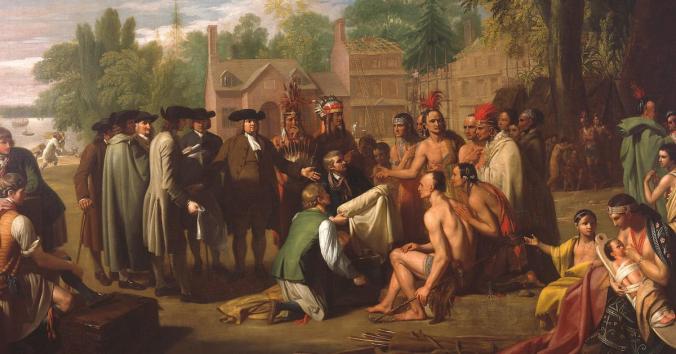
In Iroquois tribal society authority flowed from the ground up, not from the top down.
Thomas Jefferson was deeply influenced by Native American wisdom, as his father Peter was a cartographer. They would go off on excursions together and Peter and would have meetings at their home in Virginia with the Cherokee chief Ontassete which young Tom possibly witnessed.
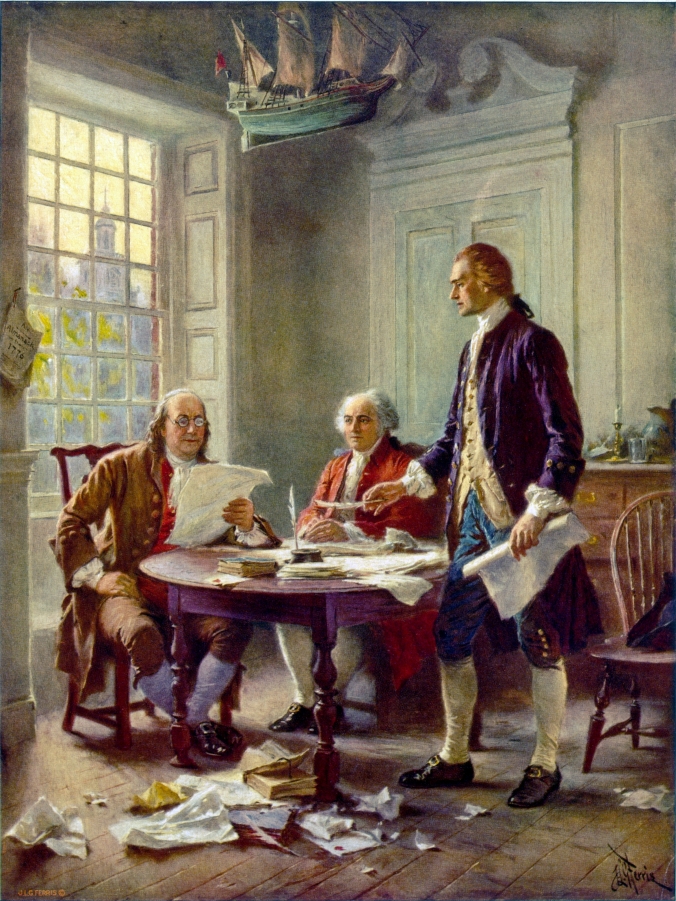
Why the Fourth of July?
The 4th July is an auspicious date indeed. It is known that on the 4th July 1776, the Continental Congress formally adopted the Declaration of Independence that had been largely drafted by Thomas Jefferson.
However, some 32 years prior on the 4th July 1744, an important meeting took place that was also fundamental to the founding of the United States of America. A charismatic chief from the Iroquois Nation, Canassatego, met with the the English colonists to forge an alliance between the colonists and the Iroquois against the French.
He spoke of unity:
“Our wise forefathers established union and amity between the Five Nations. This has made us formidable. This has given us great weight and authority with our neighboring nations. We are a powerful confederacy and, by your observing the same methods our wise forefathers have taken, you will acquire much strength and power; therefore, whatever befalls you, don’t fall out with one another.”
Benjamin Franklin, present at the meeting relayed a powerful example that Canassatego demonstrated to the colonists, describing how the chief held up an arrow and easily snapped it in two. He then lashed together twelve arrows, (one for every one of 12 colonies represented at the meeting), and even the strongest man in the room could not break them.
Perhaps it’s no coincidence that the Great Seal of the United States, designed in 1782 by Charles Thomson, depicts an eagle clutching thirteen arrows in his claws.
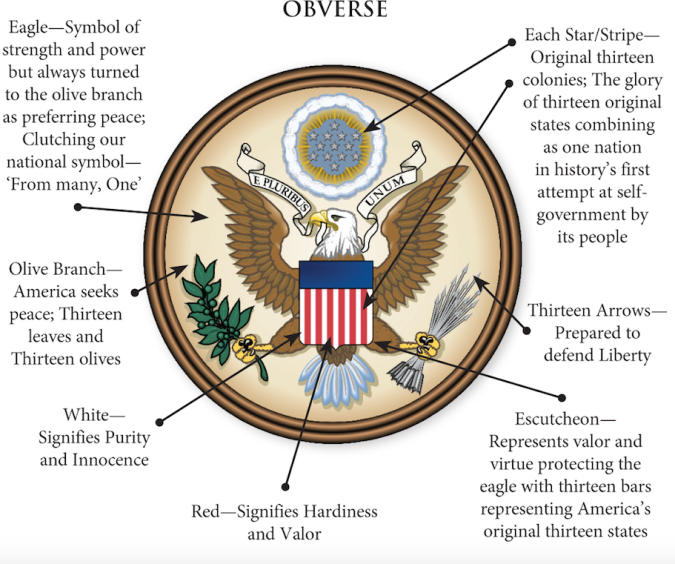
And it has a certain poetic justice that the President is referred to as the Commander-in-Chief!
In 1751 Franklin began his campaign for a federal union, writing: “It would be a very strange thing if six nations of ignorant savages should be capable of forming a scheme for such a union and be able to execute it in such a manner as that it has subsisted ages, and yet a like union should be impractical for ten or a dozen English colonies.” Aside from his jibe at ‘ignorant savages’, Franklin expressed admiration for Iroquois political practise. And thus, a new republic was created based on Native tribal wisdom.
It’s disappointing but not altogether surprising, that information explaining the role of Native American culture on the founding of the United States was repressed until the seventies.
How about this for a tragic and sobering statistic:
When Christopher Colombus discovered the New World in 1492 it was estimated there were around 6 million Native Americans living across the continent. Some argue there were many more, upwards of 20 million. But the white settlers brought with them a host of big city ‘plagues’ that were new to them, such as smallpox, measles and syphilis. The native population had no immunity to these diseases. In addition to the ravages of disease, other factors compounded their fate; warfare, forced migration, outright slaughter and a massive white land grab. By 1900 the Native American population had been reduced to around 250,000 souls.
“You can’t justify the whole conquest and subjugation and destruction of Indian populations if there are things of value in the people you are destroying.”
Donald Grinde
The forgotten Founding Mothers
Although Franklin and the Founding Fathers acknowledged the contributions of the Iroquois Nation, they left out the specific role of tribal women in America’s Constitution. Maybe this was a step too far, and would not have been accepted at the time. Too often women’s role in history is brushed under the carpet or concealed. We should not overlook the importance and influence of the Council of Grandmothers.
In Iroquois culture the Earth, plants and land were perceived as feminine in character – older women were responsible for the basics of life – growing and preparing food, birthing and nurturing children and the domestic work of the community.
This work was of value and the men recognised and appreciated the women’s fundamental power. A far cry from the underrated role of modern mothers. It was in everyone’s interest for the clan to be successful.
The clan was usually headed up by an older woman. Property and land was collectively owned by the clans and enough food grown to feed all of their members. It was a broadly egalitarian society and the Iroquois men understood the need for men and women to achieve unity and work together in balance and harmony.
True political power was in the hands of the grandmothers, who possessed the authority to select a chief and also to impeach him for wrongdoing or incompetence. The original impeachers!
The women even made the final decision about whether or not to go to war. When women were past childbearing age they became clan mothers and would often accompany war parties. They could be just as ruthless as men with enemy tribes outside the confederacy, especially when it involved the abduction of clan children. Maternal instincts can be as brutal as they are nurturing when required!
It seems that the clan mothers may have inspired the early 19th American feminists, Susan B. Anthony and Elizabeth Cady Stanton who had contact with and learnt from Iroquois women.
Mother Earth and Father Sky came out of balance as patriarchy retained all the power in Western civilisation. The disconnection from the sacred feminine enabled the plundering of Earth’s resources, and put us out of touch with the natural world.
As usual, Marina’s lyrics are spot on:
“The world has never yet seen a truly virtuous nation, because in the degradation of women, the very fountains of life are poisoned at the source.”
Elizabeth Cady Stanton
The pursuit of happiness (as defined by the Iroquois Confederacy), was held in balance as long as citizens did not cause harm to others. One could argue that the pursuit of happiness has taken on a darker, materialistic slant in so much as corporate greed is running rampant with no regard for the consequence to human life and the planet. But that’s a subject for a new post!
In the meantime, even with all the turbulence and turmoil around us, as much as you can – be happy!
